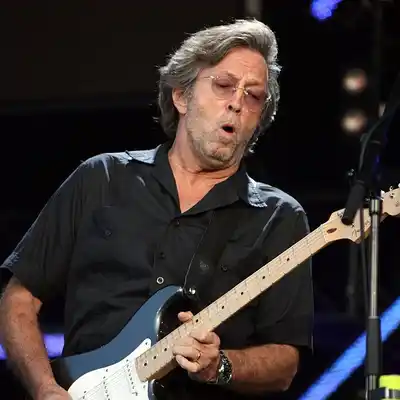
Eric Clapton – The Life and Guitars of The Legend
Eric Clapton, known as one of the most influential guitarists in the history of rock music, has left an indelible mark on the world with his unique playing style and soulful music. As a versatile musician and songwriter, Clapton has been a part of several legendary bands and enjoyed a highly successful solo career.
In this post, we’ll delve into the life of this extraordinary guitarist, his guitars, and the gear that defined his sound.
Table of Contents
Early Life and Career
Born on March 30, 1945, in Ripley, Surrey, England, Eric Patrick Clapton was raised by his grandparents after his mother left him at a young age. As a teenager, Clapton developed an interest in the blues, inspired by artists such as Robert Johnson, Muddy Waters, and B.B. King. He picked up his first guitar at 13 and began practicing relentlessly.
Clapton’s professional career took off when he joined the Yardbirds in 1963. His exceptional guitar skills quickly earned him the nickname “Slowhand.”
Although Clapton left the Yardbirds in 1965, he went on to form Cream with Jack Bruce and Ginger Baker in 1966, further establishing his reputation as a blues-rock virtuoso.
Cream disbanded in 1968, but Clapton continued to make music, forming Blind Faith with Steve Winwood, Ginger Baker, and Ric Grech, and later joining Delaney & Bonnie and Friends.
In 1970, Clapton embarked on a solo career, releasing his eponymous debut album. Over the years, he created classics such as “Layla,” “Wonderful Tonight,” and “Tears in Heaven.”
Clapton has received numerous awards, including 18 Grammy Awards and three inductions into the Rock and Roll Hall of Fame.
So, Eric Clapton’s illustrious career has spanned over six decades, during which he has continually pushed the boundaries of guitar playing and inspired countless musicians.
Clapton’s Guitars
Throughout his career, Eric Clapton has been associated with various guitars that have contributed to his signature sound. Some of the most notable guitars in his collection include:
1. Fender Stratocaster “Blackie”
Arguably Clapton’s most famous guitar, Fender “Blackie” was assembled from the parts of three different 1950s Stratocasters. This guitar was Clapton’s primary instrument from 1970 to 1985 and can be heard on albums such as “Slowhand” and “Just One Night.”
2. Gibson Les Paul “Beano”
This Gibson 1960 Les Paul Standard earned its nickname from the cover of the “John Mayall & The Bluesbreakers” album, where Clapton is seen reading a “Beano” comic. The guitar played a significant role in shaping Clapton’s early sound, particularly during his tenure with the Bluesbreakers and Cream.
3. Martin 000-28EC
Clapton has been associated with several Martin acoustic guitars, but the 000-28EC is one of his favorites. This signature model was inspired by the 1939 000-42 Martin that Clapton used for his MTV Unplugged performance in 1992.
Guitar Equipment
Clapton’s sound has evolved over time, and his gear choices have played a crucial role in that evolution. Some of the most important pieces of equipment in his arsenal include:
Amplifiers
Clapton has used several amps throughout his career, but he is most famous for using Marshall amplifiers during his early days, particularly with the Bluesbreakers and Cream.
Later in his career, he switched to Fender amplifiers, with the Twin Reverb and the custom-built Fender EC Series becoming his go-to choices.
These amps have played a significant role in shaping Clapton’s sound, from the raw and powerful tone of his early years to the more refined and versatile sound he developed later on.
Effects Pedals
Clapton’s use of effects pedals has been relatively minimal compared to other guitarists. However, he has relied on some essential pedals to enhance his sound.
The Ibanez Tube Screamer, particularly the TS-808 and TS-9 models, has been a crucial part of his setup for achieving his signature overdriven tone. Clapton has also utilized the wah-wah pedal, most notably on the iconic track “White Room” with Cream.
